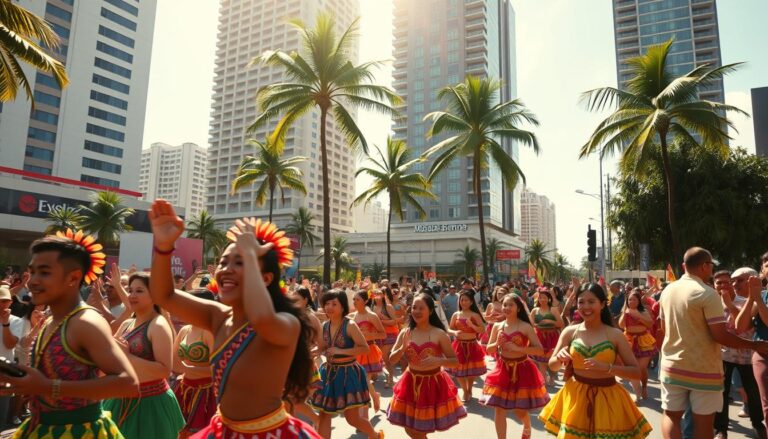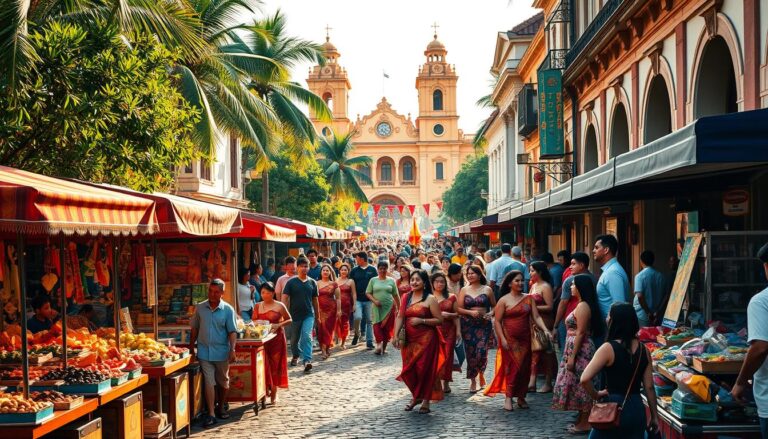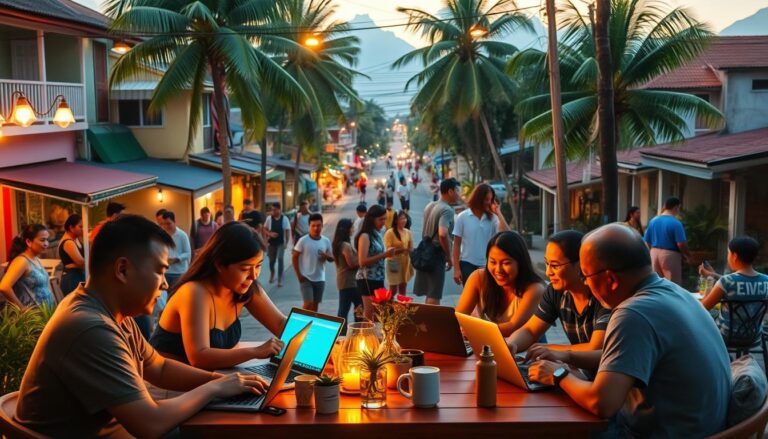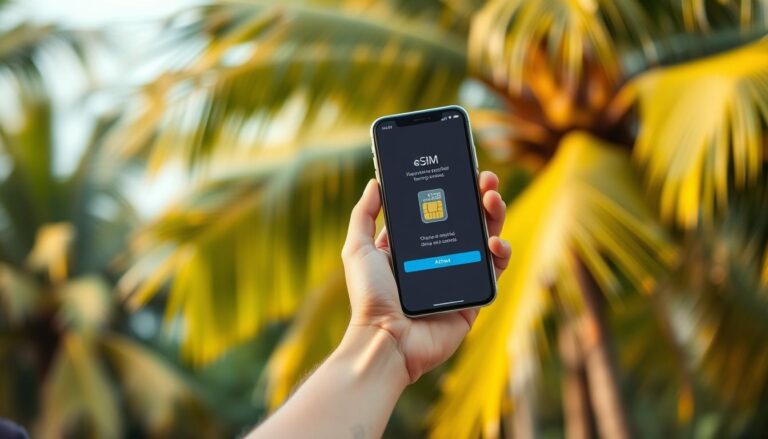Digital Nomads Guide: Philippine Visas & Work‑Stay
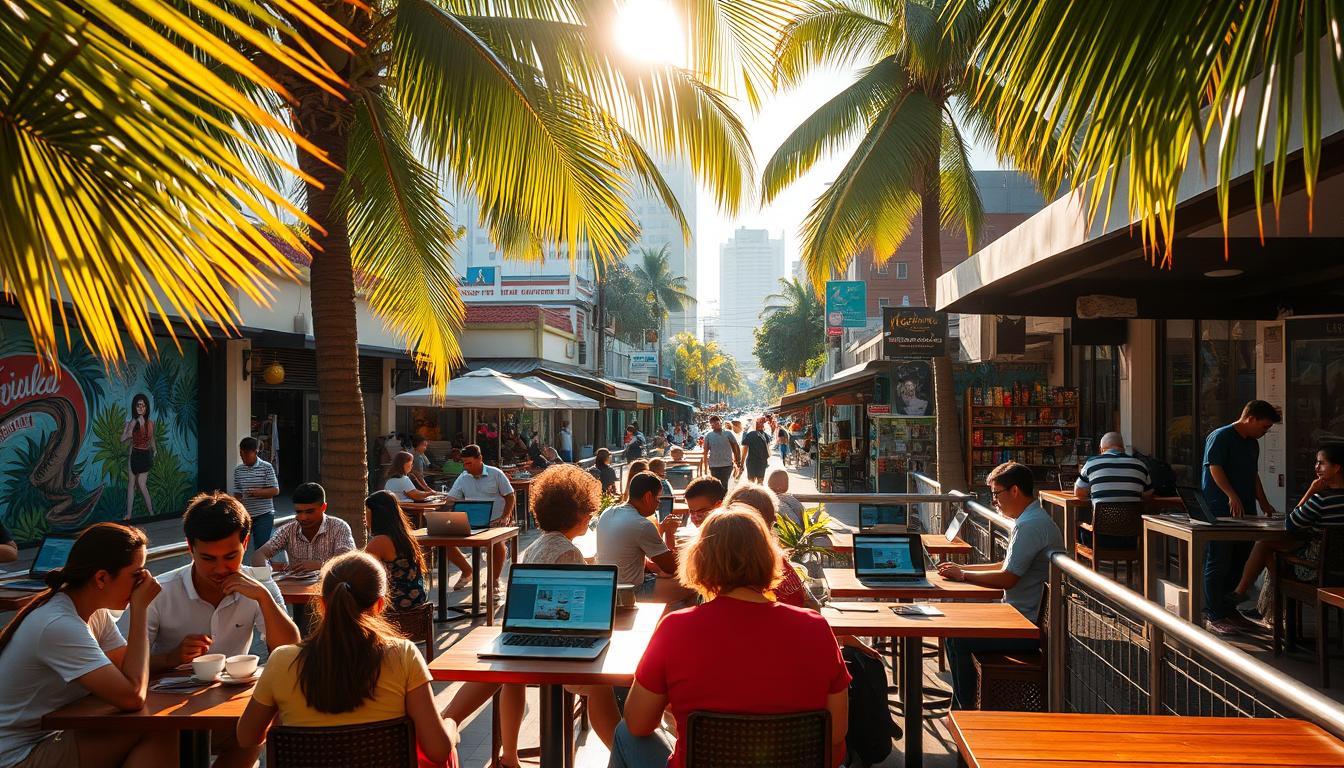
Welcome to your essential resource for navigating the Philippine visa process. This guide is designed for remote professionals seeking a new adventure. We will help you unlock the potential of this incredible Southeast Asian nation.
The Philippines has emerged as a top destination for the modern remote worker. Its combination of affordability, natural beauty, and friendly communities is unmatched. You can build a fulfilling life while exploring over 7,000 stunning islands.
This comprehensive resource covers everything you need to know. We explain the different visa options and application steps. You will also learn how to create a productive routine in places like Manila, Siargao, and Palawan.
Why choose this archipelago? The country offers a low cost of living and an English-speaking population. You will find strong internet connectivity and vibrant expat groups. It’s the perfect place to blend work and exploration.
Our advice comes from real experiences and expert knowledge. We want to help you avoid common mistakes. Get ready to start your journey toward a balanced and exciting lifestyle.
Key Takeaways
- The Philippines is a highly affordable and welcoming country for remote professionals.
- Understanding the correct visa type is the first critical step for a long-term stay.
- Major hubs and islands offer reliable infrastructure for a productive work environment.
- A strong English-speaking population makes cultural integration smoother.
- This guide provides practical steps to build a sustainable work-travel routine.
- You can enjoy a high quality of life while exploring breathtaking beaches and landscapes.
Understanding Philippine Visas for Digital Nomads
Your journey to the Philippines as a remote professional begins with understanding the available visa pathways. The country offers several options tailored to different needs and stay durations. Getting this right from the start ensures a smooth and compliant experience.
Visa Types and Eligibility
Citizens from many countries can enter visa-free for an initial 30 days. This is a great way to test the waters before committing to a longer stay. If you love it, you can extend this tourist visa for up to 36 months.
Extensions require regular visits to an immigration office and payment of fees. For a more permanent solution, consider the Special Resident Retiree’s Visa (SRRV). It’s available to those aged 35 and above and requires a bank deposit.
New programs are also emerging to cater specifically to location-independent professionals. Make sure your passport is valid for at least six months beyond your planned departure date. You will also need to show proof of onward travel and financial stability.
Application Timelines
Planning your time is crucial. Tourist visa extensions are often processed within a few days. More complex visas, like the SRRV, can take several weeks to finalize.
It’s vital to track your visa’s expiration date closely. Overstaying can lead to significant fines and other legal problems. Staying compliant is the key to a stress-free adventure.
Exploring Work‑Stay Options in the Philippines
Your choice between short-term and long-term stays will shape your entire experience in the archipelago. Each approach offers unique benefits for balancing work and exploration.
Short-term arrangements typically last 1-3 months. This timeframe lets you test different locations without long-term commitment. You can experience multiple islands and communities.
Short-term vs. Long-term Stays
For the adventurous digital nomad, short-term stays provide incredible flexibility. Popular spots include Siargao’s surf culture and El Nido’s stunning landscapes. Cebu offers urban comforts with easy beach access.
Long-term stays of 6+ months bring different advantages. You can establish deeper community connections in cities like Manila or Makati. Monthly apartment rentals often provide significant cost savings.
Consider your work requirements and personal preferences. Short-term options allow exploration across diverse locations. Long-term arrangements support stable routines and local immersion.
Many remote professionals start with a short exploratory trip. This helps you find the perfect place before committing long-term. Assess internet reliability, coworking spaces, and lifestyle amenities.
Philippine Visa Requirements and Application Process
Gathering the right paperwork is your first practical step toward living and working in the Philippines. Having your documents organized saves time and reduces stress during the application process.
Each visa type has specific requirements, but several core documents apply to most applications. Being prepared shows immigration officials you’re serious about complying with local laws.
Essential Documents
Your passport must have at least six months validity remaining. It also needs blank pages for entry stamps and visa stickers. This is non-negotiable for entry.
Proof of onward travel demonstrates you plan to leave within your authorized stay. Officials want to see confirmed flight tickets exiting the Philippines. Some travelers use refundable tickets for flexibility.
Financial capacity is proven through bank statements showing consistent income or savings. Most applications require 3-6 months of statements. The amounts vary by visa type.
| Document Type | Tourist Visa | Business Visa | Long-term Stay |
|---|---|---|---|
| Passport Validity | 6+ months | 6+ months | 12+ months |
| Financial Proof | 3 month statements | 6 month statements | 6 month statements + minimum balance |
| Processing Time | 3-7 days | 10-14 days | 15-30 days |
“The best-prepared applications move through the system fastest. Organization is your greatest advantage when dealing with immigration paperwork.”
Every digital nomad should make sure they complete the official application forms accurately. Double-check all information before submission. Small errors can delay processing by several days.
Keep digital copies of everything in cloud storage. This protects you if physical documents are lost. Having backups ensures you can proceed with your plans smoothly.
Requirements can vary slightly by nationality. Always verify current requirements with official Philippine immigration sources. This ensures your application meets the latest standards.
Navigating Remote Work Opportunities Abroad
Finding reliable remote work is the foundation of a successful location-independent lifestyle. The good news is there are a lot of ways to earn a steady income from anywhere.
You can choose from many different types of job roles. Popular options offer great flexibility for any digital nomad.
Finding Remote Jobs and Freelance Gigs
Freelancing lets you define your own schedule. Many professionals start with skills they already have.
- Freelance writing for blogs and websites.
- Virtual assistant roles handling emails and schedules.
- Web development and design for online businesses.
- Teaching English online with a TEFL certification.
Creative opportunities are also plentiful. These include social media management, translation, and video editing.
Specialized platforms list these remote positions. Check sites like FlexJobs, WeWorkRemotely, and LinkedIn.
Building a strong online portfolio is key. Showcase your best work to attract clients. Start with small gigs while keeping another job. This helps you build a stable income over time.
Diversifying your income streams creates more security. The most successful digital nomad professionals often combine several remote gigs.
Building a Sustainable Digital Nomad Lifestyle
Creating a lasting remote work life requires more than just a passport and a laptop. It’s a complete shift in how you view success and security.
This lifestyle trades traditional benefits for incredible freedom. You say goodbye to a predictable paycheck, paid time off, and employer-sponsored health plans.
Financial stability is your new priority. Establish multiple income streams to protect yourself from slow periods. Keep an emergency fund that covers at least six months of expenses.
Self-discipline becomes your most valuable skill. Without a boss looking over your shoulder, you must manage your own time and meet deadlines. It takes a lot of focus.
Becoming a digital nomad is a long-term commitment, not a vacation. Success comes from treating your work with professionalism while enjoying the freedom.
| Aspect | Traditional Mindset | Sustainable Nomad Mindset |
|---|---|---|
| Success Metric | Salary, Job Title | Freedom, Experiences |
| Security | Employer Benefits | Multiple Income Streams |
| Work Structure | Office Hours | Self-Imposed Routines |
| Location | Stability in One Place | Balance of Stability & Adventure |
Build routines that support both productivity and well-being. Set consistent work hours and create a dedicated space to work, even in temporary homes.
A sustainable lifestyle for any nomad isn’t about constant movement. It’s about finding places you love and staying long enough to build a real life.
Balancing Work and Travel While Abroad
Finding harmony between your professional duties and your adventurous spirit is the ultimate test of the remote work lifestyle. It’s easy to feel pulled in two directions. You want to be productive, but you also don’t want to miss out on incredible travel experiences.
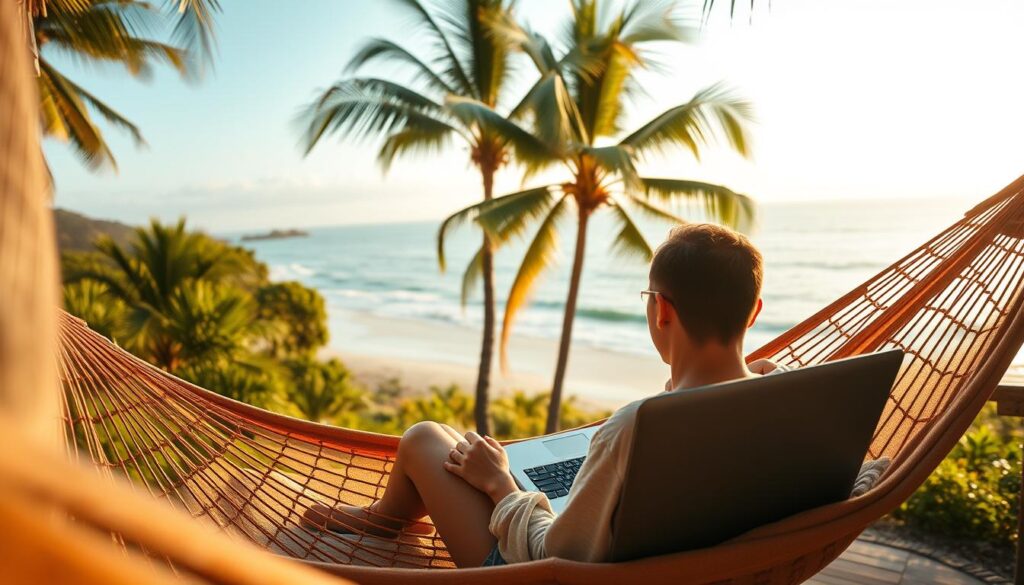
This balance is not about working less. It’s about working smarter. Effective time management is your most powerful tool for creating a fulfilling life on the road.
Time Management Tips
Start each day with a clear plan. Block out specific hours for deep work. Treat this time as non-negotiable.
Techniques like the Pomodoro method can boost focus. Work for 25 minutes, then take a 5-minute break. This prevents burnout and keeps your mind fresh.
Set realistic daily goals. Completing your most important tasks first frees up your evening for exploration. Remember, this is a marathon, not a sprint.
Maintaining Health and Productivity
The constant change of location can be mentally draining. Give yourself permission to have quiet days. Not every day needs to be an adventure.
Establish simple routines. Wake up and go to bed at consistent times, even when you travel. Find a dedicated workspace, like a cozy cafe corner.
Listen to your body. When you feel overwhelmed, it’s okay to slow down. Staying longer in one place can recharge your energy. A successful nomad knows that well-being is the foundation of great experiences.
Essential Digital Nomads Guide Strategies for Success Abroad
Mastering the balance between legal compliance and professional excellence separates thriving remote workers from those who struggle abroad. The most accomplished professionals develop systems that ensure both immigration adherence and work reliability.
Visa Navigation and Compliance
Visa compliance is your non-negotiable priority when working overseas. Overstaying or working illegally can lead to serious fines, deportation, and future travel bans.
Create a practical system for tracking expiration dates. Set calendar reminders well before deadlines. Keep digital copies of all immigration documents organized.
Remote Work Best Practices
Treat your remote work with the same seriousness as traditional employment. Establish clear routines and maintain consistent communication with clients.
Research internet speeds before booking accommodations. Always have backup options like mobile hotspots. Use co-working spaces for important meetings.
Manage time zone differences by clearly communicating your availability. Use scheduling tools and be flexible for critical calls. This approach helps you become digital professional who delivers quality work regardless of location.
Continuous skill development keeps you competitive in the remote market. Build professional networks through online communities and local meetups. These connections provide valuable support and opportunities.
Remote Work Tools and Resources
Your mobile office setup determines your productivity and comfort while working remotely from the Philippines. The right equipment transforms any space into an efficient workspace.
A reliable laptop forms the core of your mobile office. Choose lightweight, durable models that withstand travel. Universal adapters with USB ports keep all devices powered.
Must-Have Gadgets for Traveling
Noise-cancelling headphones like Bose Quiet Comfort 35 create focus in busy cafes. Power banks ensure your devices stay charged during long work sessions away from outlets.
WiFi extenders boost weak signals in apartments. eSIM cards provide instant data access in 60+ countries. These tools make any place suitable for professional work.
| Gadget Category | Essential Features | Travel Benefits |
|---|---|---|
| Power Solutions | Multi-port charging, compact size | Works anywhere, charges multiple devices |
| Connectivity Tools | Signal boosting, backup options | Reliable wifi in any location |
| Productivity Gear | Noise cancellation, ergonomic design | Better focus and comfort |
Reliable Internet and Connectivity Solutions
Always research wifi speeds before booking accommodations. Mobile hotspots serve as reliable backups. VPN services protect sensitive data on public networks.
For coffee enthusiasts, portable makers like Aeropress ensure quality brews anywhere. These tools support the mobile lifestyle every digital nomad enjoys.
Practical Financial Management for Digital Nomads
Smart money management transforms the unpredictable nature of freelance income into a sustainable career path. Without traditional employment benefits, you need solid financial habits.
Your financial stability determines how long you can maintain your overseas adventure. Careful planning turns income fluctuations from a problem into an opportunity.
Budgeting and Expense Tracking
Create a realistic budget that accounts for both fixed and variable costs. Track every expense using apps like Mint or YNAB to understand your spending patterns.
Separate your money into categories like accommodation, food, and activities. This helps you control costs and save during profitable periods.
Always maintain an emergency fund covering at least six months of expenses. This protects you during slow work weeks or unexpected situations.
Optimizing Income Streams
Diversify your revenue sources across multiple clients or projects. This creates stability when one income stream slows down.
Gradually raise your rates as you gain experience and testimonials. Consider developing passive income through digital products or affiliate marketing.
Choose banking providers without international transaction fees. Services like Wise offer better exchange rates for managing money across borders.
Leveraging Co-Working Spaces and Community
Finding your professional tribe while working remotely can transform your entire experience abroad. Co-working spaces provide the perfect environment for both productivity and connection.
These shared offices offer more than just reliable WiFi. They create professional settings with meeting rooms and ergonomic furniture. This separation between work and living space boosts focus.
Popular spots in the Philippines include:
- KMC Solutions and The Loft in Manila
- Workplace in Cebu
- Emerging spaces in Siargao
Membership options fit different needs. Day passes work for occasional use. Monthly plans suit regular attendees. This flexibility helps remote workers balance cost and commitment.
The social benefits are equally valuable. You naturally meet other nomads sharing similar lifestyles. These connections often lead to friendships and collaborations.
Co-living spaces like Outsite combine housing with built-in work areas. They organize community activities that create instant networks. This approach helps combat travel loneliness.
View co-working memberships as investments in both productivity and well-being. The community and structure these spaces provide justify the cost for many professionals.
Training and Skill Development for Remote Careers
Building marketable skills is your ticket to joining the location-independent workforce. You don’t need to abandon your current career path entirely. Instead, focus on adapting your existing abilities for remote opportunities.
Online Learning Platforms
Affordable online courses provide excellent ways to gain remote-ready skills. Platforms like Udemy offer technical training, while Skillshare focuses on creative disciplines.
LinkedIn Learning provides professional development courses. Google Skillshop delivers digital marketing certifications. Choose one platform that aligns with your goals.
Gaining Certifications for Remote Work
Specific certifications can open doors to better remote job opportunities. TEFL certification qualifies you to teach English online worldwide.
Digital marketing certifications like Google Analytics demonstrate valuable expertise. Project management credentials help you lead remote teams effectively.
| Certification Type | Popular Programs | Remote Work Opportunities |
|---|---|---|
| Language Teaching | TEFL/TESOL | Online English instruction |
| Digital Marketing | Google Analytics, Facebook Blueprint | Remote marketing roles |
| Technical Skills | AWS, Azure certifications | Cloud computing positions |
| Project Management | PMP certification | Remote team leadership |
View skill development as an ongoing journey rather than a one-time achievement. Continuous learning ensures long-term success for any digital nomad.
Navigating Health, Insurance, and Safety Abroad
Protecting your health and safety is fundamental to enjoying a sustainable remote work experience overseas. Comprehensive insurance provides peace of mind when medical needs arise far from home.
Reputable providers like Safety Wing offer flexible monthly coverage designed for location-independent professionals. World Nomads provides comprehensive plans including adventure sports. Allianz has an extensive global network for reliable service.
When choosing coverage, consider emergency evacuation and pre-existing conditions. Research hospital quality in major Philippine cities versus remote islands. Medical facilities in Manila and Cebu offer excellent care.
Safety begins with researching neighborhoods before booking accommodations. Use trusted transportation services and secure your valuables. Stay aware of common tourist scams during your travel.
Mental well-being matters too. Some plans now include telemedicine for stress management. Take time to establish routines that combat loneliness.
Make sure you keep digital copies of all documents in secure cloud storage. This includes insurance policies, vaccination records, and emergency contacts.
Preventive practices like staying current on Philippines-recommended vaccinations help maintain your health. These steps ensure any digital nomad can focus on their adventure with confidence.
Embracing Minimalism and Lifestyle Optimization
Our ancestors understood mobility as survival, moving with seasons for resources. Modern consumer culture reversed this, encouraging accumulation of stuff that anchors us to one place. Embracing minimalism reconnects us with that ancient freedom.
This philosophy shifts focus from owning things to collecting experiences. For the modern digital nomad, it creates the lightness needed for spontaneous movement between locations.
Decluttering Your Life
Transitioning requires tough decisions about possessions. You typically have just 23kg of checked luggage plus carry-on capacity. This forces intentional choices about what truly matters for your new lifestyle.
Start by selling valuable things to fund initial travels. Donate usable goods to charity. Store irreplaceable sentimental items with family or in small storage units. The process can feel emotionally challenging.
Our culture conditions us to equate belongings with success. Letting go of stuff from your home requires mental rewiring. Remember that security comes from adaptability, not accumulation.
Choosing Essential Gear for Travel
Adopt the capsule wardrobe concept with versatile pieces that mix and match. Choose multi-purpose items that serve several functions. Prioritize quality over quantity for durability during constant travel.
Practical tools like packing cubes or mesh wash bags keep your limited possessions organized. Compression bags save space for bulkier items. Your packing list will evolve as you learn what you actually need.
Resist accumulating new things at each destination. Implement a “one in, one out” rule where new purchases require discarding something equivalent. This maintains your mobile living standard.
Minimalism extends beyond physical possessions. Digital decluttering, relationship optimization, and schedule simplification all contribute to a balanced lifestyle. Every person can benefit from focusing on essentials.
Success Stories and Lessons Learned from Digital Nomads
Real stories from seasoned travelers reveal the true potential of location-independent careers. These experiences show how people transform their life while working from anywhere.
After five years on the road, many professionals discover creative solutions. One traveler eliminated a $2,600 monthly apartment payment. They stored possessions with family and redirected 40% of income into savings.
Overcoming Challenges on the Road
Loneliness is a common challenge for any nomad. Successful travelers join local communities and coworking spaces. They build routines that balance work and social connection.
Income volatility requires smart planning. Diversifying clients creates stability during slow periods. Many learn to embrace flexibility rather than fight it.
Inspirational Journeys and Takeaways
Some choose part-time travel, spending 4-6 months each year exploring. This approach maintains a home base while offering adventure. It proves you don’t need constant movement.
Creative exchanges like Workaway provide valuable experiences. One professional learned video editing while helping a family in Hawaii. These opportunities reduce costs while building skills.
Every journey looks different. What works for one nomad might not suit another. The key is designing a lifestyle that matches your personal goals.
Planning Long-Term Nomadic Trips
Long-term travel planning requires a different mindset than short vacations. Instead of packing every day with activities, you’ll balance work routines with gradual exploration. This approach creates sustainable trips that can last for months or even years.
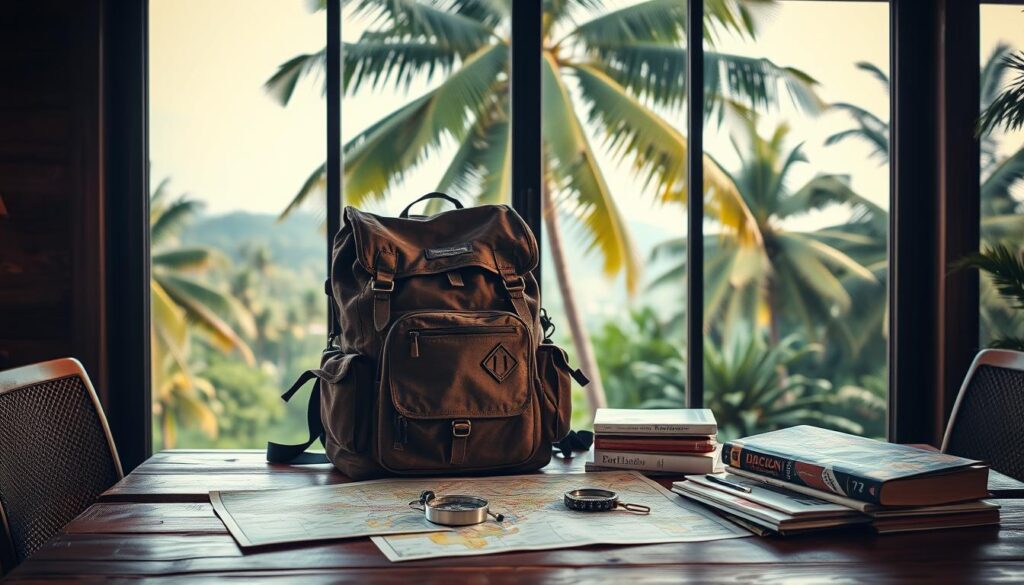
Setting Realistic Goals
Start by choosing your travel pace. Some prefer moving every few weeks, while others stay in one place for several months. Faster pacing offers variety, but slower travel supports deeper connections and work consistency.
Research destinations based on multiple factors. Consider internet reliability, cost of living, and visa requirements. Also think about time zones relative to your clients and personal interests like language learning or outdoor activities.
Geographic arbitrage can extend your journey significantly. Earning in strong currencies while living in affordable countries makes long trips more feasible. This economic strategy helps many people become digital nomad professionals.
Book accommodations just one or two locations ahead. This maintains flexibility while ensuring you meet work deadlines. Remember that most days will involve regular work routines with adventures reserved for weekends.
Start with a trial period of 3-6 months before committing long-term. This lets you test whether this lifestyle truly suits you. Many find that becoming a digital nomad transforms how they see the world.
Conclusion
Embracing a mobile career path offers more than just scenic backdrops for your workday. This guide has shown that building a sustainable lifestyle abroad requires practical planning around visas, income, and community.
Remember that this way of living isn’t for everyone, and that’s perfectly fine. Even short-term experiments can provide valuable experiences and skills. The Philippines stands out as an ideal starting place with its welcoming culture and affordable living.
Your journey begins with a single step. Research visa requirements, develop remote skills, or save for a trial trip. Many people have successfully made this transition before you.
The most important lesson is that there’s no single correct path. Continuous learning and adaptation will shape your unique adventure. Your balanced life of work and exploration awaits.

